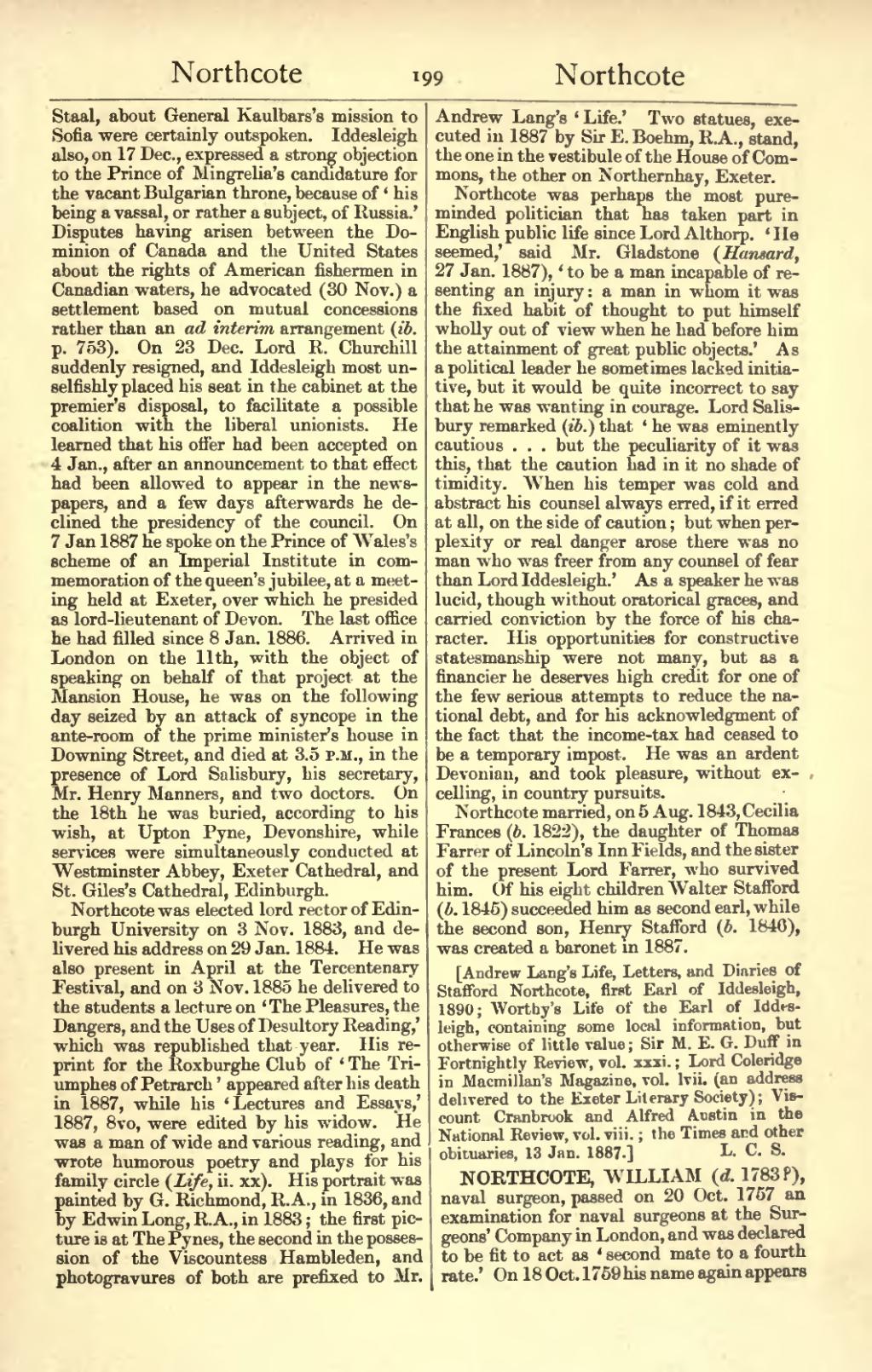Staal, about General Kaulbars's mission to Sofia were certainly outspoken. Iddesleigh also, on 17 Dec., expressed a strong objection to the Prince of Mingrelia's candidature for the vacant Bulgarian throne, because of `his being a vassal, or rather a subject, of Russia.' Disputes having arisen between the Dominion of Canada and the United States about the rights of American fishermen in Canadian waters, he advocated (30 Nov.) a settlement based on mutual concessions rather than an ad interim arrangement (ib. p. 753). On 23 Dec. Lord R. Churchill suddenly resigned, and Iddesleigh most unselfishly placed his seat in the cabinet at the premier's disposal, to facilitate a possible coalition with the liberal unionists. He learned that his offer had been accepted on 4 Jan., after an announcement to that effect had been allowed to appear in the newspapers, and a few days afterwards he declined the presidency of the council. On 7 Jan 1887 he spoke on the Prince of Wales's scheme of an Imperial Institute in commemoration of the queen's jubilee, at a meeting held at Exeter, over which he presided as lord-lieutenant of Devon. The last office he had filled since 8 Jan. 1886. Arrived in London on the 11th, with the object of speaking on behalf of that project at the Mansion House, he was on the following day seized bv an attack of syncope in the ante-room of the prime minister's house in Downing Street, and died at 3.5 p.m., in the presence of Lord Salisbury, his secretary, Mr. Henry Manners, and two doctors. On the 18th he was buried, according to his wish, at Upton Pyne, Devonshire, while services were simultaneously conducted at Westminster Abbey, Exeter Cathedral, and St. Giles's Cathedral, Edinburgh.
Northcote was elected lord rector of Edinburgh University on 3 Nov. 1883, and delivered his address on 29 Jan. 1884. He was also present in April at the Tercentenary Festival, and on 3 Nov. 1885 he delivered to the students a lecture on 'The Pleasures, the Dangers, and the Uses of Desultory Reading,' which was republished that year. His reprint for the Roxburghe Club of `The Triumphes of Petrarch' appeared after his death in 1887, while his 'Lectures and Essays,' 1887, 8vo, were edited by his widow. He was a man of wide and various reading, and wrote humorous poetry and plays for his family circle (Life, ii. xx). His portrait was painted by G. Richmond, R.A., in 1836, and by Edwin Long, R.A., in 1883; the first picture is at The Pynes, the second in the possession of the Viscountess Hambleden, and photogravures of both are prefixed to Mr. Andrew Lang's ' Life.' Two statues, executed in 1887 by Sir E. Boehm, R.A., stand, the one in the vestibule of the House of Commons, the other on Northemhay, Exeter.
Northcote was perhaps the most pureminded politician that has taken part in English public life since Lord Althorp. 'He seemed,' said Mr. Gladstone (Hansard, 27 Jan. 1887), 'to be a man incapable of resenting an injury: a man in whom it was the fixed habit of thought to put himself wholly out of view when he had before him the attainment of great public objects.' As a political leader he sometimes lacked initiative, but it would be quite incorrect to say that he was wanting in courage. Lord Salisbury remarked (ib.) that `he was eminently cautious … but the peculiarity of it was this, that the caution had in it no shade of timidity. When his temper was cold and abstract his counsel always erred, if it erred at all, on the side of caution; but when perplexity or real danger arose there was no man who was freer from any counsel of fear than Lord Iddesleigh.' As a speaker he was lucid, though without oratorical graces, and carried conviction by the force of his character. His opportunities for constructive statesmanship were not many, but as a financier he deserves high credit for one of the few serious attempts to reduce the national debt, and for his acknowledgment of the fact that the income-tax had ceased to be a temporary impost. He was an ardent Devonian, and took pleasure, without excelling, in country pursuits.
Northcote married, on 5 Aug. 1843, Cecilia Frances (b. 1822), the daughter of Thomas Farrer of Lincoln's Inn Fields, and the sister of the present Lord Farrer, who survived him. Of his eight children Walter Stafford (b. 1845) succeeded him as second earl, while the second son, Henry Stafford (b, 1846), was created a baronet in 1887.
[Andrew Lang's Life, Letters, and Diaries of Stafford Northcote, first Earl of Iddesleigh, 1890; Worthy's Life of the Earl of Iddesleigh, containing some local information, but otherwise of little value; Sir M. E. G. Duff in Fortnightly Review, vol. xxxi.; Lord Coleridge in Macmillan's Magazine, vol. lvii. (an address delivered to the Exeter Literary Society); Viscount Cranbrook and Alfred Austin in the National Review, vol. viii.; the Times and other obituaries, 13 Jan. 1887.]
NORTHCOTE, WILLIAM (d. 1783?), naval surgeon, passed on 20 Oct. 1757 an examination for naval surgeons at the Surgeons' Company in London, and was declared to be fit to act as `second mate to a fourth rate.' On 18 Oct. 1759 his name again appears
